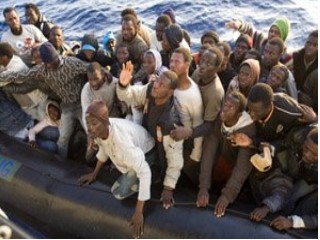Italy: Offer to Shelter Eritreans Detained, Abused by Libya
 (Washington, DC) - The Italian government should immediately offer to take into Italy at least 11 Eritreans it had previously forced back to Libya and who are now detained there and threatened with deportation back to Eritrea, Human Rights Watch said today. The Italian Navy had previously blocked these Eritreans from reaching Italy by sea and summarily returned them to Libya without giving them the chance to claim asylum.
(Washington, DC) - The Italian government should immediately offer to take into Italy at least 11 Eritreans it had previously forced back to Libya and who are now detained there and threatened with deportation back to Eritrea, Human Rights Watch said today. The Italian Navy had previously blocked these Eritreans from reaching Italy by sea and summarily returned them to Libya without giving them the chance to claim asylum.
"Italy never gave these people a chance to seek asylum, and now they are at great risk of being dumped in the desert or deported to Eritrea," said Bill Frelick, Refugee Program director at Human Rights Watch. "Italy bears responsibility for people it pushed back to Libya, a country with no refugee law that has been brutalizing them. Italy put them in this danger, Italy should get them out."
The Italian government says it has brokered a deal for the release of the Eritrean detainees to do "socially useful" work in Libya at the direction of Libyan authorities. According to the Libyan Foreign Ministry, the Eritrean embassy in Tripoli will deliver identity cards to about 400 Eritreans in Libya.
The detainees have resisted the requirement that they subject themselves to identification by the government they fled. Some of the detainees have been able to contact Human Rights Watch. They said that they fear that filling out these bio-data forms provided by the Eritrean embassy will put their families in Eritrea at risk and possibly pave the way for their deportation.
"The Eritrean government regards people who flee the country as traitors," Frelick said, "That Libya requires them to provide their identities to the government they have run away from shows that they are still at risk in Libya."
Italian media sources say that 140 of the detainees have signed the forms. Some of the detainees told Human Rights Watch that those who signed the forms were coerced or duped into doing so and are frightened of the consequences for their families still in Eritrea.
Libyan authorities are using extremely harsh measures to force detainees to fill out the bio-data forms. Detainees informed Human Rights Watch that 10 of the 205 Eritreans who had been transferred from the Misrata detention center to al-Biraq detention center were taken out and beaten. On July 7, a group including 31 men, 13 women, and 7 children remaining in Misrata said they were beaten when they refused to fill in forms again.
"Given the deterrent impact of Italian naval interdiction that has caused a dramatic decline in boat departures from Libya, and the lack of opportunity for Eritreans to seek or enjoy asylum in Libya," Frelick said, "Italy should consider offering to resettle the entire group of 400 Eritreans being coerced to register their identities through the Eritrean embassy in Tripoli."
On July 1, 2009, as part of a campaign to keep refugees from reaching their shores, the Italian Navy forced onto a Libyan vessel 82 people who were fleeing by boat to Italy, of whom 76 were Eritreans. They were picked up by the Libyan authorities. At least 11 of the Eritreans pushed back that day are among a group transferred out of the Misrata detention center on June 30. Libyan authorities transported them to al-Biraq detention center in the Sahara desert near Sabha, a town with an airport that has been the site of previous deportations to Sub-Saharan African countries.
Detainees informed Human Rights Watch that the Eritreans were jammed into three shipping containers mounted on trucks for the 12-hour, non-stop journey through the desert. Detainees told Human Rights Watch that Libyan guards severely beat them in Misrata, as well as on the way to al-Biraq. Some were taken from Misrata to hospitals, while others arrived at al-Biraq with broken limbs. The detainees said they were given no food or water during the journey and no medical attention in al-Biraq. They also said that Libyan guards told them they would be deported to Eritrea.
The 1951 Refugee Convention, to which Italy is a party, prohibits the forced return (refoulement) of people "in any manner whatsoever" to a place where their lives of freedom would be threatened. This prohibition bars authorities in one country from pushing asylum seekers back to a country that, in turn, would send them to their home country without considering their refugee claims. The European Convention on Human Rights, to which Italy is also a party, forbids the forced return of people to places where they would face a real risk of being subjected to inhuman or degrading treatment of the kind these Eritreans are now experiencing in Libya.
The United Nations High Commissioner for Refugees (UNHCR) has recommended that host governments refrain from forcibly returning even rejected asylum seekers to Eritrea because of the risk that returned Eritreans will be subjected to detention and torture.
In September 2009, Human Rights Watch released a report, "Pushed Back, Pushed Around," which documented Italy's interdiction and summary return of migrants and asylum seekers to Libya. The report also documented frequent abuses of migrants while in detention in Libya, as well as the general practice of detaining migrants for indefinite periods of time.


![[AIM] Asmarino Independent Media](/images/logo/ailogo.png)